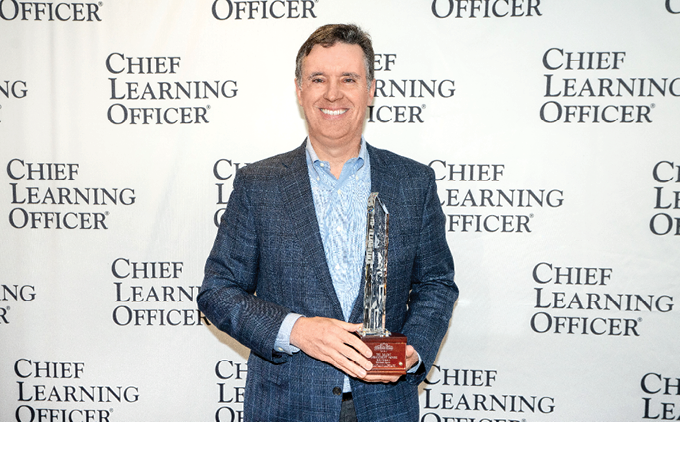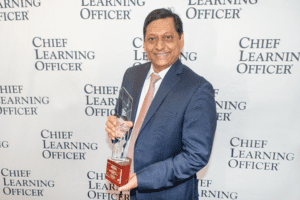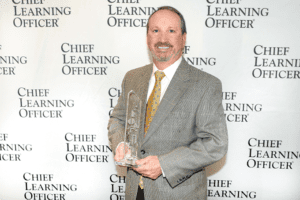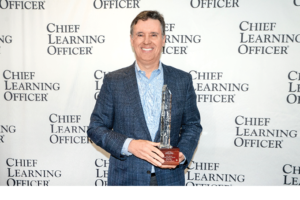
The Talent Management Award is for learning executives who have developed a program that effectively integrates learning into broader talent management initiatives such as employee engagement, onboarding, succession planning, recruiting or performance management.
by Andie Burjek
March 17, 2020
The Talent Management Award is for learning executives who have developed a program that effectively integrates learning into broader talent management initiatives such as employee engagement, onboarding, succession planning, recruiting or performance management.
DIVISION 1: For companies with 10,000 employees or more
GOLD
Arnold Dhanesar, Group Chief Talent Officer, Zurich Insurance Co.
Customers demand more from their insurers in the digital era. For the industry to adapt to these changing customer needs, so must talent adapt. That’s why Zurich Insurance developed a 10-point plan to appeal to the talent it was seeking.

Led by Dhanesar, this strategy was designed as a holistic approach that would take into account talent identification, readiness and development. The 10-point plan included developing Talent Acceleration Centers to deepen the overall talent pipeline, launching a training program for all senior leaders and upskilling managers with a new, global program.
The learning strategy was tailored around a few design principles. Zurich would leverage the employee’s own motivation, tying these programs to career advancement, which would naturally reinforce employee engagement. It also invested in a culture of continuous learning and provided regular training opportunities where employees got time away from their day jobs to focus on training and reskilling.
Zurich’s high-potential development strategy led to many promising outcomes. The globally consistent, leadership-based strategy has accelerated growth in the leadership pipeline and made it stronger. The insurer is seeing higher employee engagement and retention of top talent. Also, after first deploying this strategy in Latin America and North America, Zurich has been able to expand it into other countries.
SILVER
Derek Blake, Divisional Vice President, PSAV
Under Blake’s leadership, events experience company PSAV revamped how it deals with career development for both individuals and specific roles.
This strategy aimed to accelerate the careers and increase the confidence of all employees at PSAV, and leaders at the company believed this would lead to higher employee engagement, better business results and better customer service.
One major part of this strategy was streamlining L&D into a single LMS platform. PSAV ultimately chose to partner with SkillSoft and SumTotal Learning Management. With its new LMS, PSAV can now deliver anytime, anywhere learning, and employees can use it to work toward their career goals at their own convenience.
As a result of this initiative, PSAV delivered 218,000 learning hours in 2018. More than 11,600 employees use the career development program to set their career goals and work on acquiring the skills needed to accomplish those goals. Further, employee engagement scores have gone up 6 percentage points.
BRONZE
Michael Poll, Director Talent Development, AbbVie
While managers and people leaders at AbbVie knew what the best practices were to raise the bar on performance and have honest conversations in performance reviews, they were often intimidated to use those best practices and have real conversations with direct reports.

Poll created an approach to support people leaders in improving their performance management processes. He developed an innovative learning method that integrates behavior role-modeling of talent management practices with the focus of getting people leaders to take action through needed conversations with direct reports.
Now, people leaders indicate they have the confidence and skills while direct reports say they’re experiencing greater and more transparent talent practice conversations.
DIVISION 2: For companies with less than 10,000 employees
GOLD
Michael Byars, Director of Learning and Organizational Development, Children’s National Health System
The health care industry — and the task of leading its workforce — is complex thanks to many different factors, including health system mergers and acquisitions, changing regulations and labor shortages. That’s why Children’s National Health System began a program that would help it keep and develop top talent.
In 2014, the health system began reducing the size of its leadership team. Other challenges it faced were management turnover, faltering staff and leader engagement and no leadership development capabilities for the time being. Leaders were being asked to do more with less and had fewer potential peer mentors to provide them guidance. In this changing industry and business environment, the employee experience became inconsistent and employee engagement was threatened.

The organization developed the Children’s National Leader Academy in 2014 to address its various challenges. These courses focused on building leadership skills and reducing leadership turnover. With only six courses in its first year, the program has only grown over time as more resources have become available, now including 21 courses via classroom and e-learning.
Further, Children’s National also added more to its leadership support system in 2017 by spearheading an organization-wide effort to define the health system’s core values and behaviors. After a four-month process, including focus groups and senior leader board reviews, those values were defined as compassion, commitment and connection. Defining why staff did what they do helped leaders gain support from employees.
Children’s National has seen promising results from this initiative. Compared to 67 percent in 2014, staff engagement improved to 81 percent by 2019. Manager engagement increased from 75 percent to 85 percent in that five-year period, as well. Annual leadership turnover improved, from 12.6 percent in June 2014 to 8.4 percent in 2018 for managers.
SILVER
Tim Mulligan, CHRO, Vulcan Inc.
Mulligan set out to make Vulcan an employer of choice, not by borrowing other organizations’ best practices, but by creating their own. Whenever Vulcan rolls out a new HR program, policy or employee engagement initiative, it has to be forward-thinking, cutting-edge and different from what other organizations are doing.
Looking to improve its performance management function, Vulcan designed and launched a continuous, unique performance management program with Saba TalentSpace. This helped the organization create a culture of constant feedback for its workforce.
Surveys show that employee engagement and employee satisfaction are high, and that they find the platform easy to use and are easily able to track their goals and performance. They also know this platform isn’t just another off-the-shelf program, but something created just for them with the Vulcan culture in mind.
BRONZE
Janiece Ziegler, Director, Ally
Ally Auto used storytelling through computer animation to show what the organization does and how exactly employees contribute to the company’s success. The video, “Ally Auto Overview,” shows employees a car and how it moves from the equipment manufacturers to the dealership to the person who buys the car.
Employees had previously indicated that they wanted to gain a stronger understanding of the big picture of what Ally Auto does. Ziegler understood that when considering all types of employees — from virtual to field agents to onsite — a video could reach everybody. Further, the video is designed to appeal to many audiences, like recruits, new employees, seasoned employees and leadership.
Results have been positive. The video, available to 5,000 Ally Auto finance employees, has led to cost savings of about $425,000 compared with instructor-led training, the previous learning method offered. It has also helped improve employee engagement survey results. The design team is now working on expanding the concept from “Ally Auto Overview” to 25-plus additional videos and a landing page for learners.




